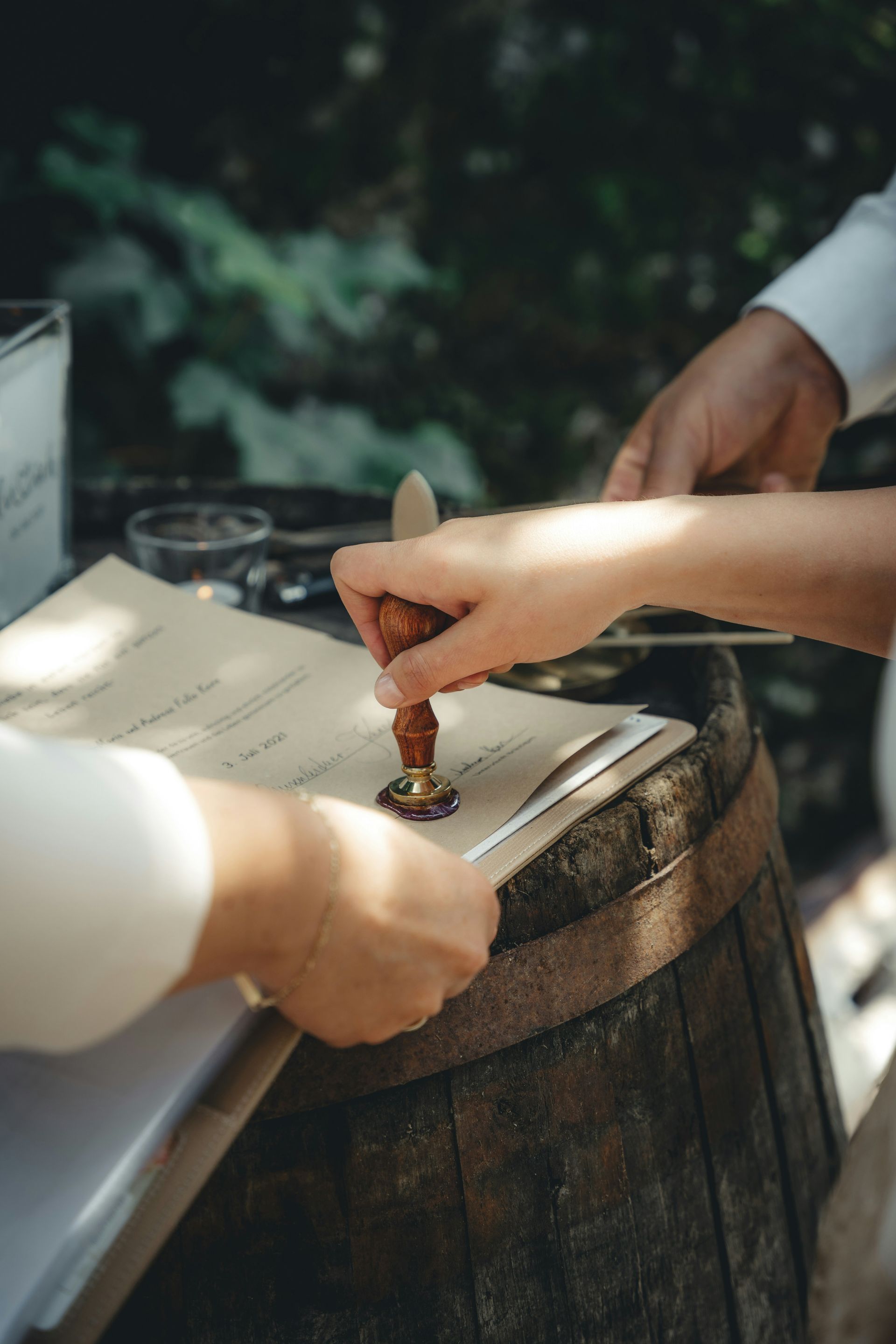Unraveling Notary History
This passage explores the fascinating history of notarizations, revealing many interesting stories from various time periods.
Era of Ancient Egypt: 2750-2250 B.C.
The inception of notarizations traces back to ancient Egypt, specifically in 2750 BC, where scribes, known as "sesh," emerged as the earliest chroniclers of official communications. During the Old Kingdom, these scribes played a pivotal role in recording agreements in a society that relied on bartering rather than cash. The esteem for their recordings was so profound that even Pharaoh Tutankhamen included writing equipment in his tomb for the afterlife.
Roman Empire's Notarial Dawn: 535
Fast-forwarding to the Roman Empire in 535, Marcus Tullius Tiro took center stage as the recognized pioneer of notaries. He developed a shorthand writing system, notae tironinae, which became instrumental in recording crucial speeches and judicial proceedings. The title "Notarius" was bestowed upon shorthand note-takers, laying the foundation for the term "notary."
Knights Templar Order: 1099-1307
By 800 A.D., notaries expanded beyond exclusive appointments to the Emperor, Pope, or other high-ranking officials. Their popularity soared, enabling church officials and others to draft internationally recognized instruments on behalf of bishops, abbots, and counts. The Knights Templar, established in 1099 after the First Crusade, evolved into a powerful force by 1307. Their clergy, highly educated in the art of notarization, became gatekeepers for Templar business, official documents, orders, and proclamations. Their contributions extended to shaping the modern banking system, mortgages, and loans.
Notaries in Medieval England: 13th and 14th Centuries
In the 13th and 14th centuries in England, public notary laws, many of which are still used in the United States, began to take shape. Although initially appointed by the Papal Legate or the Archbishop of Canterbury, notaries eventually transitioned to being elected by their peers.
Columbus and the Exploration of New Worlds: 15th Century
During the 15th century, notaries played a crucial role in Christopher Columbus's exploration of the New World, accompanying him on voyages and serving as witnesses to ensure accountability to King Ferdinand and Queen Isabella.
Notary Publics in Early & Modern America: 1600-1800
The American narrative unfolds in 1639 when Thomas Fugill became the first American colonist appointed as a notary public in New Haven, Connecticut. Massachusetts followed suit in 1644 by appointing the first general or common-law notary.
In Colonial America (1600-1800), notaries were appointed based on high moral character, ensuring the safety of crucial documents during trans-Atlantic commerce. Their role was perilous, with instances of notaries being killed due to their involvement in authenticating official documents amidst power struggles in the New World.
Notarizations in the Contemporary 21st Century
Fast-forwarding to the 21st century, notarizations continue to hold a significant role in modern society, affirming the authenticity of a diverse range of documents. Despite variations in notary laws across provinces and states, the overarching principle of preserving recorded documents remains a guiding force. In the present day, modern notaries aren't just professionals with stamps and signatures; they are the guardians of authenticity, ensuring that the stories of our time are recorded accurately.
Intriguing Stories Across the Ages
Medieval Marvels:
- In the medieval era, Notaries found themselves playing a unique role, occasionally summoned to witness the marriages of royalty and members of the peerage, adding a touch of regality to their notarial duties.
Shakespearean Speculations:
- The connection between Shakespeare and a Warwickshire Notary sparks speculation that the Bard's encounters with English Notaries might have been the muse behind masterpieces like "The Merchant of Venice," weaving the world of literature into the realm of notarial inspiration. There is substantial evidence suggesting that Shakespeare was once employed by a Warwickshire Notary, and later, he maintained frequent interactions with other English Notaries.
Gender Shifts in the 1900s:
- Transitioning to the early 1900s, the historical narrative unveils the gender barriers that once restricted women from assuming the role of Notaries in America. This constraint gradually faded away over time, marking a significant evolution in notarial roles.
Sports and Cereal Oaths:
- A curious twist takes us into the world of sports, where baseball legend Pete Rose, agreeing to feature on a Wheaties box, is led to swear before a Notary that he had been a dedicated consumer of the cereal since his childhood, showcasing the unexpected intersections of sports and notarization.
South Carolina's Divine Requirement:
- South Carolina introduces a unique historical quirk – a 127-year-old law that mandates Notary applicants to swear allegiance to God. An ongoing legal challenge from an atheist before the state's Supreme Court adds a contemporary twist to this historical oddity.
Dali's Artistic Detour:
- The narrative takes an artistic turn as surrealist painter Salvador Dali diverges from his father's aspirations for him to become a Notary, choosing instead to pursue alternative passions in the realm of art.
Ancient Scribes of Egypt:
- Delving into ancient history, the scribes of Ancient Egypt, known as "sesh," emerge as indispensable chroniclers in the Old Kingdom, utilizing intricate bartering systems for business transactions and leaving behind a legacy valued even in the afterlife.
Notarial Dawn in the Roman Empire:
- The Roman Empire introduces Marcus Tullius Tiro, recognized as the first notary in history, whose shorthand system, notae tironinae, becomes pivotal in recording speeches and judicial proceedings, birthing the term "Notarius."
Knights Templar Legacy:
- The Knights Templar transition from protectors of Christian pilgrims to influential figures, with their highly-educated notaries becoming gatekeepers for Templar business, documents, and proclamations, contributing significantly to societal advancements.
Shaping Notary Laws in England:
- England in the 13th and 14th centuries plays a crucial role in shaping notary laws, laying the groundwork for practices inherited by the United States through English common law. The emergence of the first American colonist notary, Thomas Fugill, in 1639 marks a milestone.
Notaries and Columbus:
- Notaries join Christopher Columbus during the 15th-century exploration of the New World, standing witness to treasures and voyages, serving as testaments for King Ferdinand and Queen Isabella, who sought to ensure proper accounting for all discovered treasures. Notaries accompanied Columbus on all his voyages, mirroring the practice followed by most early Spanish explorers. On October 12, 1492, when Columbus first set eyes on the New World, a Notary named Rodrigo de Escobedo documented the landing on San Salvador Island in the Bahamas.
Colonial America's Notarial Perils:
- Colonial America (1600-1800) casts notaries as custodians of moral character, appointed to safeguard crucial documents during trans-Atlantic commerce. The perilous nature of their role, occasionally resulting in fatalities, reflects the high stakes in the New World power struggles.
Papal Notaries and the English Church:
- Once church officials were appointed by the Pope, Notaries transitioned into roles commissioned by the Archbishop of Canterbury in England and its American colonies after Henry VIII separated from the Church of Rome.
Colonial Notaries in Trans-Atlantic Commerce:
- In colonial times, Notaries played a crucial role in trans-Atlantic commerce. Before the era of electronic communication, merchants on both sides of the Atlantic relied on Notaries to serve as honest third parties in reporting damage to ships or cargo, a notarial act known as a "marine protest."
First American Notary's Misconduct:
- The inaugural Notary of the American Colonies, Thomas Fugill, appointed in 1639 in the New Haven Colony, failed in his duties and was ousted for falsifying documents.
Louisiana's Unique Notarial System:
- With the Louisiana Purchase in 1803, a fragment of the French legal system, including its unique Notarial practices based on the Napoleonic Code, became part of the United States. Louisiana Notaries continue to possess powers akin to those of attorneys.
Presidential Appointments of District of Columbia Notaries:
- At the turn of the century, the President of the United States held the authority to appoint Notaries for the District of Columbia, serving five-year terms at the President's discretion. Today, the Mayor of the District assumes this responsibility.
Women's Struggle for Notarial Roles:
- Until the early 1900s, women in America were barred from becoming Notaries, reflecting broader voting restrictions. Justice Oliver Wendell Holmes Jr. argued that the absence of women Notaries in England precluded affirming their capability. Presently, over two-thirds of American Notaries are women.
Mystery of "Notary Sojak.":
- In the 1920s and 1930s, the phrase "Notary Sojak" appeared in the popular comic strip "Smokey Stover." The meaning remains unknown.
Wheaties Box Oath:
- When baseball player Pete Rose was asked to feature on a Wheaties box, he had to sign an affidavit, sworn in the presence of a Notary, affirming his lifelong consumption of the cereal.
Tennessee's Duelist Ban:
- In Tennessee, statutes once prohibited "known duelists" from becoming Notaries due to their perceived questionable reputation.
South Carolina's Faith Requirement:
- In South Carolina, a 127-year-old law mandates Notary applicants to swear allegiance to God. An ongoing Supreme Court case involves an atheist challenging this requirement.
"Notary" Hero in Hollywood:
- In the classic film "D.O.A.," the protagonist, portrayed by Edmund O'Brien, was a Notary tasked with finding an antidote to a deadly poison within two hours.
Salvador Dali's Notary Aspirations:
- Despite his father's desire for him to become a Notary, surrealist painter Salvador Dali pursued different aspirations.
Da Vinci, Son of a Notary:
- Artist-inventor Leonardo da Vinci, the son of a Notary, developed the skill of writing backward to protect his ideas, requiring a mirror to decipher his thoughts.
Mark Twain, Notary Public:
- In 1864, Samuel Clemens, known as Mark Twain, became a Notary Public in Nevada, marking the only genuine public office to which he was appointed.
"Notarygate" Scandal:
- California tax attorney/Notary Frank DeMarco, Jr., faced accusations of fraudulently backdating forms related to President Richard M. Nixon's donation of papers to the National Archives. DeMarco resigned to avoid a state investigation, and the incident added to the erosion of Nixon's political support, ultimately leading to his resignation.
Notary Services Richmond Hill
Commitment to Compliance and Security
We place a high premium on compliance with legal standards and security measures. Let's delve deeper into our commitment to ensuring your documents are handled with the utmost care.
Compliance with Regulations
Our notaries are well-versed in the ever-evolving legal landscape. They stay informed about the latest regulations and requirements to ensure that your documents meet the necessary standards for submission. This commitment to compliance ensures that your notarized documents will be accepted without hesitation.
Cutting-Edge Security Measures
Security is a top priority for Online Notary Services Richmond Hill. Our process employs state-of-the-art encryption and security protocols to safeguard the confidentiality and integrity of your documents. Rest assured that your sensitive information is protected throughout the online notarization process.
Verification of Identity
Online notarization may raise concerns about identity verification. We address this by rigorously authenticating your identity during the virtual meeting with a notary. This ensures that the notarization process is secure and that the document's authenticity is maintained.
The Importance of Notary Public Services for Legal Documents in Richmond Hill
Want more information?
Disclaimer
We at Notary Services Richmond Hill pride ourselves on providing helpful resources to help explain notarization. Nothing on this site shall be construed as legal advice and no paralegal - client relationship and/or attorney -client relationship are established. Always check with your own legal representatives, advisors, or document recipients, if you have any unanswered questions about notarization or digitally notarized documents.
Notary Services Richmond Hill 24/7










